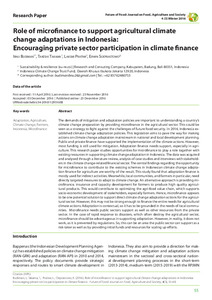Aufsatz

Role of microfinance to support agricultural climate change adaptations in Indonesia: Encouraging private sector participation in climate finance
Abstract
The demands of mitigation and adaptation policies are important to understanding a country’s climate change preparation by providing microfinance in the agricultural sector. This could be seen as a strategy to fight against the challenges of future food security. In 2014, Indonesia established climate change adaptation policies. This legislation aims to pave the way for making actions on climate change adaptation mainstream in national and local development planning. Public and private finance have supported the implementation of the climate actions. However, most funding is still used for mitigation. Adaptation finance needs support, especially in agriculture. This research paper studies opportunities for microfinance to play a role together with existing resources in supporting climate change adaptation in Indonesia. The data was acquired and analysed through a literature review, analysis of case studies and interviews with stakeholders in the climate change-related financial sector. The central findings regarding the opportunity for microfinance to contribute to the existing schemes in Indonesian climate change adaptation finance for agriculture are worthy of the result. This study found that adaptation finance is mostly used for indirect activities. Meanwhile, local communities, and farmers in particular, need directly targeted measures to adapt to climate change. An alternative approach is providing microfinance, insurance and capacity development for farmers to produce high quality agricultural products. This would contribute to optimizing the agri-food value chain, which supports socio-economic development of stakeholders, especially farmers. Hence, microfinance appears to be one potential solution to support direct climate change adaptation actions for the agricultural sector. However, this may not be strong enough to finance the entire needs for agricultural climate actions. Adaptation is contextual, so it has to be grounded in the needs of local communities. Microfinance needs public sectors support as well as other resources from the private sector. In the case of rapid response to disasters, which often destroy the agricultural sector, microfinance should be advantageous in supporting adaptation. However, in reality, it does not work, as it is prevented by regulations. So, this can be an area the public sector can support as a risk-taker as well as by providing initial funds and resources for scaling up efforts.
Citation
In: Future of Food: Journal on Food, Agriculture and Society. Witzenhausen : University of Kassel, Department of Organic Food Quality and Food Culture. - Vol. 4, No. 3 (2016), S. 55 - 68Citation
@article{urn:nbn:de:hebis:34-2016112951608,
author={Budiman, Ibnu and Takama, Takeshi and Pratiwi, Laksmi and Soeprastowo, Erwin},
title={Role of microfinance to support agricultural climate change adaptations in Indonesia: Encouraging private sector participation in climate finance},
year={2016}
}
0500 Oax 0501 Text $btxt$2rdacontent 0502 Computermedien $bc$2rdacarrier 1100 2016$n2016 1500 1/eng 2050 ##0##urn:nbn:de:hebis:34-2016112951608 3000 Budiman, Ibnu 3010 Takama, Takeshi 3010 Pratiwi, Laksmi 3010 Soeprastowo, Erwin 4000 Role of microfinance to support agricultural climate change adaptations in Indonesia: Encouraging private sector participation in climate finance / Budiman, Ibnu 4030 4060 Online-Ressource 4085 ##0##=u http://nbn-resolving.de/urn:nbn:de:hebis:34-2016112951608=x R 4204 \$dAufsatz 4170 7136 ##0##urn:nbn:de:hebis:34-2016112951608
<resource xsi:schemaLocation="http://datacite.org/schema/kernel-2.2 http://schema.datacite.org/meta/kernel-2.2/metadata.xsd"> 2017-01-03T15:11:46Z 2017-01-03T15:11:46Z 2016-12-23 2197-411X urn:nbn:de:hebis:34-2016112951608 http://hdl.handle.net/123456789/2016112951608 eng Department of Organic Food Quality and Food Culture at the University of Kassel, Germany and Federation of German Scientists (VDW) Urheberrechtlich geschützt https://rightsstatements.org/page/InC/1.0/ Adaptation Agriculture Climate change Farmers Indonesia Microfinance 630 Role of microfinance to support agricultural climate change adaptations in Indonesia: Encouraging private sector participation in climate finance Aufsatz The demands of mitigation and adaptation policies are important to understanding a country’s climate change preparation by providing microfinance in the agricultural sector. This could be seen as a strategy to fight against the challenges of future food security. In 2014, Indonesia established climate change adaptation policies. This legislation aims to pave the way for making actions on climate change adaptation mainstream in national and local development planning. Public and private finance have supported the implementation of the climate actions. However, most funding is still used for mitigation. Adaptation finance needs support, especially in agriculture. This research paper studies opportunities for microfinance to play a role together with existing resources in supporting climate change adaptation in Indonesia. The data was acquired and analysed through a literature review, analysis of case studies and interviews with stakeholders in the climate change-related financial sector. The central findings regarding the opportunity for microfinance to contribute to the existing schemes in Indonesian climate change adaptation finance for agriculture are worthy of the result. This study found that adaptation finance is mostly used for indirect activities. Meanwhile, local communities, and farmers in particular, need directly targeted measures to adapt to climate change. An alternative approach is providing microfinance, insurance and capacity development for farmers to produce high quality agricultural products. This would contribute to optimizing the agri-food value chain, which supports socio-economic development of stakeholders, especially farmers. Hence, microfinance appears to be one potential solution to support direct climate change adaptation actions for the agricultural sector. However, this may not be strong enough to finance the entire needs for agricultural climate actions. Adaptation is contextual, so it has to be grounded in the needs of local communities. Microfinance needs public sectors support as well as other resources from the private sector. In the case of rapid response to disasters, which often destroy the agricultural sector, microfinance should be advantageous in supporting adaptation. However, in reality, it does not work, as it is prevented by regulations. So, this can be an area the public sector can support as a risk-taker as well as by providing initial funds and resources for scaling up efforts. open access In: Future of Food: Journal on Food, Agriculture and Society. Witzenhausen : University of Kassel, Department of Organic Food Quality and Food Culture. - Vol. 4, No. 3 (2016), S. 55 - 68 Budiman, Ibnu Takama, Takeshi Pratiwi, Laksmi Soeprastowo, Erwin </resource>
The following license files are associated with this item:
Urheberrechtlich geschützt

